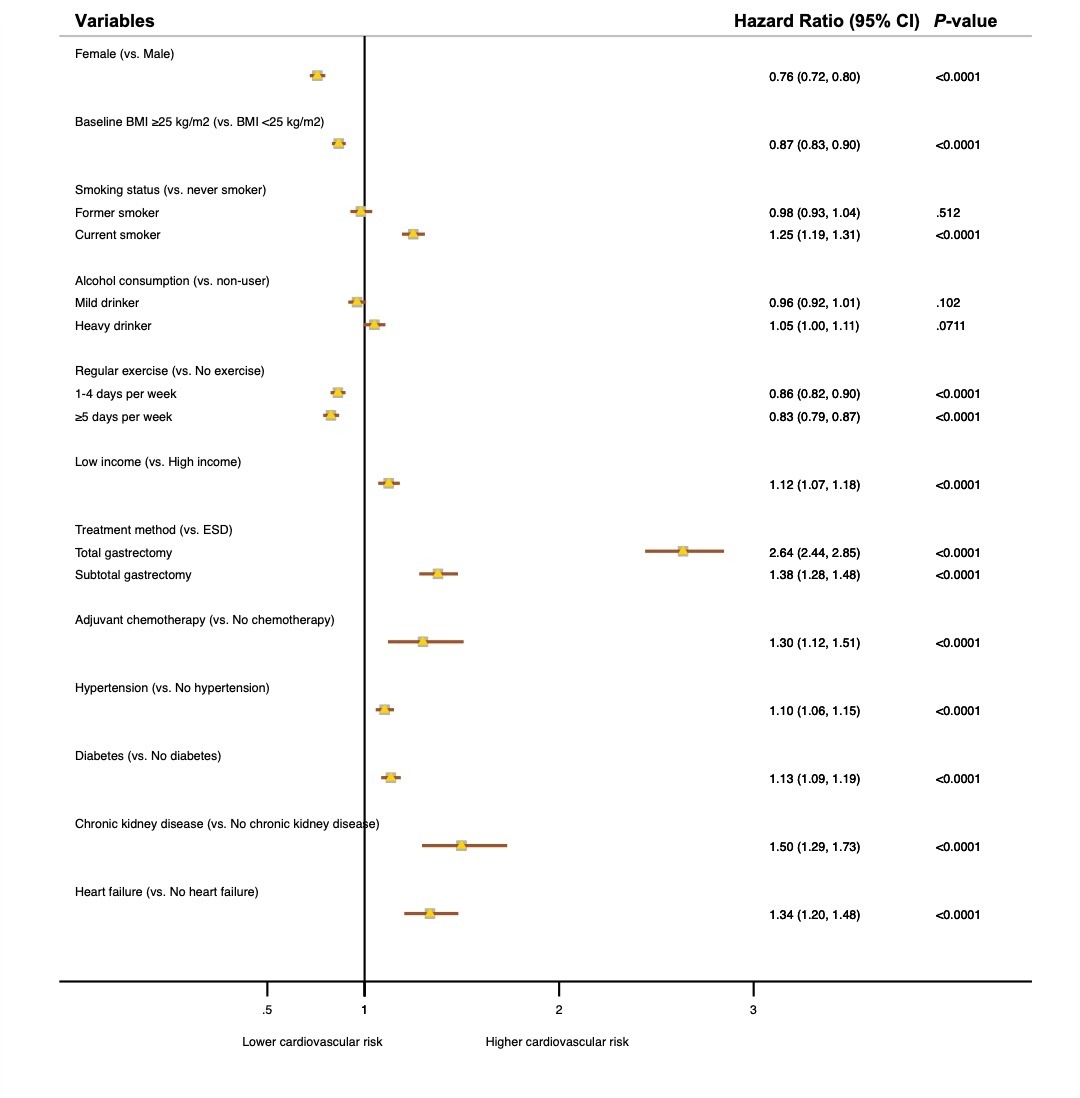Back


Poster Session C - Monday Afternoon
Category: Stomach
C0691 - Risk Factors of Adverse Cardiovascular Events in Patients With Gastric Cancer: A Nationwide Population-Based Study
Monday, October 24, 2022
3:00 PM – 5:00 PM ET
Location: Crown Ballroom

Has Audio

Jane Ha, MD
Korea University College of Medicine
Boston, MA
Presenting Author(s)
Jane Ha, MD1, Yeongkeun Kwon, MD, PhD1, Dohyang Kim, MS2, Jinseub Hwang, PhD2, Jin-Won Kwon, MPH, PhD3, Sungsoo Park, MD, PhD1
1Korea University College of Medicine, Seoul, Seoul-t'ukpyolsi, Republic of Korea; 2Daegu University, Gyeongsan-si, Kyongsang-bukto, Republic of Korea; 3Kyungpook National University, Daegu, Taegu-jikhalsi, Republic of Korea
Introduction: Long-term comorbidity care for gastric cancer survivors has been emphasized to decrease mortality as well as the development of metabolic disease and cardiovascular diseases. However, evidence is scarce on the risk factors affecting the risks of adverse cardiovascular events in patients with gastric cancer.
Methods: A nationwide cohort by the National Health Insurance Service in Korea was utilized. Patients who received gastrectomy or endoscopic submucosal dissection (ESD) for gastric cancer between 2004 and 2013 were identified. An adverse cardiovascular event was defined as a composite of acute myocardial infarction, coronary revascularization, or ischemic stroke. Fine and Gray method was used to evaluate associations between variables including treatment methods (subtotal or total gastrectomy, ESD) age, sex, body mass index (BMI), lifestyle, and comorbidities.
Results: A total of 41,905 patients treated for gastric cancer (mean age, 60.9 ± 11.0 years; female, 26.6%) were included. The incidence of adverse cardiovascular events was 9.0 cases per 1000 person-years. In multivariable models, patients who received a total (hazard ratio [HR], 2.64; 95% confidence interval [CI]; 2.44 to 2.85; P < 0.001) or subtotal gastrectomy (HR, 1.38; 95% CI, 1.28 to 1.48; P < 0.001) had a higher risk of adverse cardiovascular events than those who received ESD. Adjuvant chemotherapy also increased the cardiovascular risk with an HR of 1.30 (95% CI, 1.12 to 1.51; P= 0.001). Current smokers had a higher risk of adverse cardiovascular events (HR, 1.25; 95% CI, 1.19 to 1.31; P< 0.001), and regular exercise was a preventive factor in a dose-dependent manner (14% decreased risk in patients with 1-4 days of exercise per week and 17% decreased risk in those with ≥5 days of exercise per week compared to those who do not exercise). Higher age, male, lower BMI, smoking, low income, and the presence of hypertension, diabetes, chronic kidney disease, and heart failure were independent predictors of adverse cardiovascular events.
Discussion: We identified independent predictors of adverse cardiovascular events in patients who received treatment for gastric cancer. Experimental studies to improve modifiable risk factors are needed to confirm these findings and develop post-cancer treatment strategies to prevent adverse cardiovascular events.

Disclosures:
Jane Ha, MD1, Yeongkeun Kwon, MD, PhD1, Dohyang Kim, MS2, Jinseub Hwang, PhD2, Jin-Won Kwon, MPH, PhD3, Sungsoo Park, MD, PhD1. C0691 - Risk Factors of Adverse Cardiovascular Events in Patients With Gastric Cancer: A Nationwide Population-Based Study, ACG 2022 Annual Scientific Meeting Abstracts. Charlotte, NC: American College of Gastroenterology.
1Korea University College of Medicine, Seoul, Seoul-t'ukpyolsi, Republic of Korea; 2Daegu University, Gyeongsan-si, Kyongsang-bukto, Republic of Korea; 3Kyungpook National University, Daegu, Taegu-jikhalsi, Republic of Korea
Introduction: Long-term comorbidity care for gastric cancer survivors has been emphasized to decrease mortality as well as the development of metabolic disease and cardiovascular diseases. However, evidence is scarce on the risk factors affecting the risks of adverse cardiovascular events in patients with gastric cancer.
Methods: A nationwide cohort by the National Health Insurance Service in Korea was utilized. Patients who received gastrectomy or endoscopic submucosal dissection (ESD) for gastric cancer between 2004 and 2013 were identified. An adverse cardiovascular event was defined as a composite of acute myocardial infarction, coronary revascularization, or ischemic stroke. Fine and Gray method was used to evaluate associations between variables including treatment methods (subtotal or total gastrectomy, ESD) age, sex, body mass index (BMI), lifestyle, and comorbidities.
Results: A total of 41,905 patients treated for gastric cancer (mean age, 60.9 ± 11.0 years; female, 26.6%) were included. The incidence of adverse cardiovascular events was 9.0 cases per 1000 person-years. In multivariable models, patients who received a total (hazard ratio [HR], 2.64; 95% confidence interval [CI]; 2.44 to 2.85; P < 0.001) or subtotal gastrectomy (HR, 1.38; 95% CI, 1.28 to 1.48; P < 0.001) had a higher risk of adverse cardiovascular events than those who received ESD. Adjuvant chemotherapy also increased the cardiovascular risk with an HR of 1.30 (95% CI, 1.12 to 1.51; P= 0.001). Current smokers had a higher risk of adverse cardiovascular events (HR, 1.25; 95% CI, 1.19 to 1.31; P< 0.001), and regular exercise was a preventive factor in a dose-dependent manner (14% decreased risk in patients with 1-4 days of exercise per week and 17% decreased risk in those with ≥5 days of exercise per week compared to those who do not exercise). Higher age, male, lower BMI, smoking, low income, and the presence of hypertension, diabetes, chronic kidney disease, and heart failure were independent predictors of adverse cardiovascular events.
Discussion: We identified independent predictors of adverse cardiovascular events in patients who received treatment for gastric cancer. Experimental studies to improve modifiable risk factors are needed to confirm these findings and develop post-cancer treatment strategies to prevent adverse cardiovascular events.

Figure: Multivariable analysis of associations between demographic characteristics, treatment methods, lifestyle variables, comorbidities, and the risk of adverse cardiovascular events in patients who are treated for gastric cancer
Disclosures:
Jane Ha indicated no relevant financial relationships.
Yeongkeun Kwon indicated no relevant financial relationships.
Dohyang Kim indicated no relevant financial relationships.
Jinseub Hwang indicated no relevant financial relationships.
Jin-Won Kwon indicated no relevant financial relationships.
Sungsoo Park indicated no relevant financial relationships.
Jane Ha, MD1, Yeongkeun Kwon, MD, PhD1, Dohyang Kim, MS2, Jinseub Hwang, PhD2, Jin-Won Kwon, MPH, PhD3, Sungsoo Park, MD, PhD1. C0691 - Risk Factors of Adverse Cardiovascular Events in Patients With Gastric Cancer: A Nationwide Population-Based Study, ACG 2022 Annual Scientific Meeting Abstracts. Charlotte, NC: American College of Gastroenterology.
